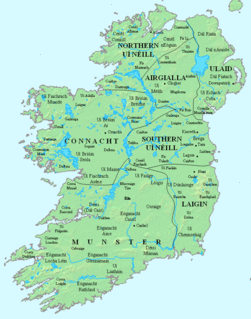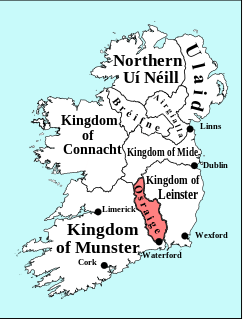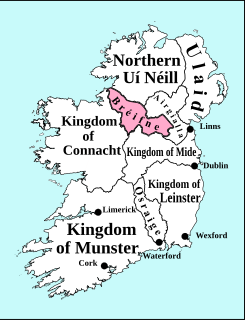Gilla Asalta (died 1172) was an Irish historian.
Gilla Asalta appears to be solely known via an obituary in the Annals of Tigernach under the year 1172, which states:

Uí Fhiachrach Aidhne was a kingdom located in what is now the south of County Galway.
Gilla Íosa Mor mac Donnchadh MacFhirbhisigh was a historian, scribe and poet of the learned Clan MacFhirbhisigh based at Lackan in Tír Fhíacrach, now part of County Sligo. He was the chief compiler of the Yellow Book of Lecan and the Great Book of Lecan, both of which are valuable literary and historical texts.

The kings of Osraige reigned over the medieval Irish kingdom of Osraige from the first or second century AD until the late twelfth century. Osraige was a semi-provincial kingdom in south-east Ireland which disappeared following the Norman Invasion of Ireland. A number of important royal Ossorian genealogies are preserved, particularly MS Rawlinson B502, which traces the medieval Mac Giolla Phádraig dynasty back through Óengus Osrithe, who supposedly flourished in the first or second century. and one in the Book of Leinster. Recent analysis of ninth and tenth century regnal succession in Osraige has suggested that in peaceful times, kingship passed primarily from eldest to youngest brother, before crossing generations and passing to sons and nephews.
Donnchadh Mór Ó Dálaigh was a celebrated Irish poet, and master of the Irish classical style called Dán Díreach, who died in 1244. Mor is the Irish word for "great".
Cúán úa Lothcháin was an Irish poet from Tethba, now in County Meath. He was the Chief Ollam of Ireland and died in 1024.
Mac Aodhagáin, is an Irish Gaelic clan of Brehons who were hereditary lawyers - firstly to the Ó Conchobhair Kings of Connacht, and later to the Burkes of Clanricarde.

The Kingdom of Breifne or Bréifne, anglicized as Breffny, was a medieval overkingdom in Gaelic Ireland. It comprised what is now County Leitrim, County Cavan and parts of neighbouring counties, and corresponds roughly to the Roman Catholic Diocese of Kilmore. It had emerged by the 10th century, as a confederation of túatha headed by an overking drawn from the Uí Briúin Bréifne.

Errew is a small rural settlement, about 8 km south from the county town of Castlebar, County Mayo, Ireland.
Events from the year 1160 in Ireland.
The Synod of Cashel of 1172, also known as the Second Synod of Cashel, was assembled at Cashel at the request of Henry II of England shortly after his arrival in Ireland in October 1171. The Synod sought to regulate some affairs of the Church in Ireland and to condemn some abuses, bringing the Church more into alignment with the Roman Rite. As such it can be seen as a continuation and part of the Irish church reform of the Twelfth Century, with the first synod of Cashel, the Synod of Rathbreasail and the Synod of Kells, slowly embracing the Gregorian Reforms. The extent to which the Synod set the direction for the relationship between the English and the Irish Church has been the subject of scholarly debate. Stephen J. McCormick described the Synod as one of the most important events of this period of Irish history.
Ruaidhri Ó Cianáin was an Irish historian.
Irish genealogy is the study of individuals and/or families who originated on the island of Ireland.
Gilla Críst Ua Máel Eóin was an Irish historian and Abbot of Clonmacnoise.
Gilla Áedha Ua Maigín, Bishop of Cork, died 1172.
Ó hUiginn is the surname of a Gaelic-Irish family of soldiers, poets, and historians located in Connacht. Originally part of the southern Uí Néill based in the Irish midlands, they moved west into Connacht. They were especially associated with what is now County Sligo, settling at Dooghorne, Achonry and Ballynary, as well as other locations in County Mayo, County Roscommon and County Galway. More than half of those bearing the surname in Ireland today still live in Connacht. The name is commonly anglicised as Higgins or O'Higgins.
Events from the year 1102 in Ireland.
Gilla may refer to:

Mac Giolla Phádraig (pronunciation) is a native Irish dynastic surname which translates into English as "Son of the Devotee of (St.) Patrick". In the medieval period, the Mac Giolla Phádraigs were hereditary kings of Osraige; today, the anglicised version of the name is commonly "Fitzpatrick".
Gilla Críst, Gille Críst, and Giolla Críost are masculine Gaelic personal names meaning "servant of Christ".